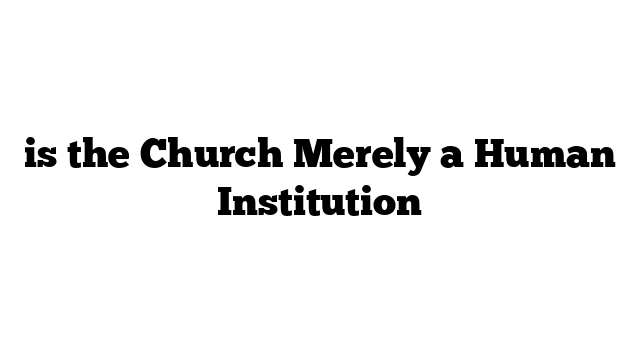Miscellaneous
Is the Church Merely a Human Institution?
Introduction
The question of whether the Church is merely a human institution or a divine institution has been a topic of discussion and debate for centuries. Some argue that the Church is purely a human institution, created and governed by fallible humans. Others believe that the Church is a divine institution established by God Himself. In this article, we will explore this question in-depth and provide insights into both perspectives.
The Human Institution Perspective
Those who argue that the Church is a human institution make several valid points. Firstly, they emphasize that the Church, throughout history, has been led by imperfect human beings. These individuals, they argue, are prone to making mistakes, succumbing to personal biases, and even committing acts contrary to the teachings of the Church. They cite examples of scandals, corruption, and abuse within the Church as evidence of its human nature.
Furthermore, proponents of the human institution perspective highlight the existence of various denominations and branches within Christianity. They assert that these divisions are a result of human interpretation, cultural differences, and historical circumstances rather than divine intention. They argue that if the Church were a truly divine institution, it would be characterized by unity and uniformity in beliefs and practices.
Lastly, those who view the Church as a human institution contend that its doctrines and teachings have evolved over time. They argue that the Church has adapted to societal changes, scientific advancements, and shifts in moral values. This, they argue, is evidence of the Church’s human nature, as it reflects the fallibility and malleability of human institutions.
The Divine Institution Perspective
On the other hand, proponents of the divine institution perspective argue that the Church is more than just a human institution. They emphasize that Jesus Christ Himself established the Church during His time on Earth, as recorded in the New Testament. According to this perspective, the Church is a direct result of Christ’s teachings, actions, and the commissioning of His disciples to spread His message.
Supporters of the divine institution perspective also highlight the spiritual nature of the Church. They believe that the Church is guided by the Holy Spirit, who guides and inspires its leaders and members. They point to the sacraments, which they consider as tangible signs of God’s grace and presence within the Church. For them, the presence of God’s divine intervention distinguishes the Church from any other human institution.
Moreover, advocates of the divine institution perspective emphasize the continuity of the Church throughout history. They argue that despite the flaws and mistakes made by individuals within the Church, the core teachings and doctrines have remained steadfast. They view these teachings as being guided by divine inspiration and protected from error, highlighting the concept of infallibility.
Conclusion
In conclusion, the question of whether the Church is merely a human institution or a divine institution is complex and multifaceted. While both perspectives offer valid arguments, it is important to recognize that the truth may lie somewhere in between. The Church is undeniably made up of fallible humans, and throughout history, it has had its share of shortcomings and controversies. However, it is also a community of faith that traces its origins to Jesus Christ and claims to be guided by the Holy Spirit.
Ultimately, individuals may have different beliefs and interpretations regarding the nature of the Church. However, what is essential is to approach this question with respect, humility, and a desire for understanding. The Church, regardless of its nature, continues to play a significant role in the lives of millions of people worldwide, serving as a place of worship, community, and spiritual growth.

